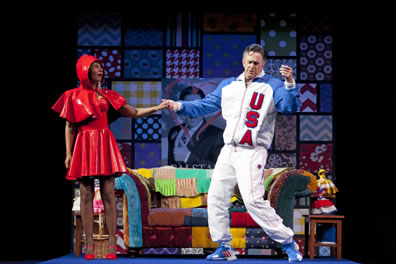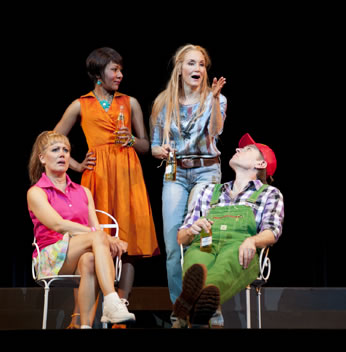The Very Merry Wives of Windsor, Iowa
A Play Full of Manure, Literally
Oregon Shakespeare Festival, Elizabeth Stage/Allen Pavilion, Ashland, Ore.
Tuesday, August 14, 2012, H–1&3 (center orchestra)
Directed by Christopher Liam Moore
Adapting Shakespeare is a practice that goes back to Shakespeare's own time (and remember, he was a grand adapter himself). In total, the effectiveness of these adaptations and their stature as dramatic art are a mixed bag: For every Throne of Blood and Ten Things I Hate about You, there is a My Private Idaho and most of David Garrick's reworking of Shakespeare's canon.

Alice Ford (Gina Daniels), wearing a vinyl Little Red Riding Hood outfit, pretends to be seduced by Senator John Falstaff (David Kelly in the Oregon Shakespeare Festival's production of The Very Merry Wives of Windsor, Iowa. Photo by T. Charles Erickson, Oregon Shakespeare Festival.
Now comes The Very Merry Wives of Windsor, Iowa, which in and of itself is a mixed bag. Alison Carey's adaptation of Shakespeare's Merry Wives of Windsor, making its world premiere at the Oregon Shakespeare Festival, turns Sir John Falstaff, the fat knight banished from Harry's company, into U.S. Senator John Falstaff (David Kelly), whose presidential bid is derailed by a poor showing in the Iowa Caucus. Left cashless in Iowa, Sen. Falstaff, like his Shakespearean antecedent, embarks on a romantic scam of Windsor's two merry wives, Margaret Page (Terrie McMahon) married to farmer George Page (Ted Deasy), and Alice Ford (Gina Daniels) married to professional golfer Francie Ford (Robin Goodrin Nordli). Yes, with same-sex marriage being legal in Iowa, the Fords are a lesbian couple well established in the community (and Falstaff an equal opportunity seducer). And it is Francie who goes into jealous rages and disguises herself as Mr. Dodge to sound out Sen. Falstaff's plot. Falstaff escapes from his first truncated rendezvous with Alice Ford in a recycling bin sent to the dump (as compared to Sir John Falstaff being sent in a buck basket to be dumped in the Thames), and he makes his second escape dressed as a drag beauty queen (vice the old woman of Brentford), and rather than being subjected to a beating by Francie Ford, he risks political suicide with this cross-dressing ruse.
Carey roughly translates other characters from Shakespeare's version to the contemporary Iowa setting (emphasis on the word roughly). Rev. Hugh Evans (Daniel T. Parker), a Canadian minister of the Church of the Unbroken Rainbow, and Doctor Kaya (Brooke Parks), a German physician, challenge each other to a hockey fight. The Manager of the Come On Inn (Judith-Marie Bergan) not only punks them but in doing so breaks their hockey sticks. This is the cruelest thing you can do to a hockey fan in Carey's world (though I never knew Germans were so adamant about hockey; a Swede would make more sense) because it inspires the minister and doctor to get revenge by posing as FBI agents and waylaying the Manager's prize pig on its way to the state fair.
Bear with me a little longer here (don't walk out yet like a handful of audience members did early in this play).
Pistol (Joe Wegner) is now Falstaff's assistant deputy press secretary, but instead of hooking up romantically with part-time cheerleading coach Miss Quickly (Catherine E. Coulson), he and Falstaff's female bodyguard, Nym (DeLanna Studi), become a romantic item. Bardolph is dropped. Roberta Shallow (Isabell Monk O'Connor) is the mayor of Windsor upset at the irregularities in Falstaff's campaign finances. She tries to set up her niece, Slender (Kjerstine Rose Anderson), a wood-carving artist, with Annie Page (played in this performance by understudy Alejandra Escalante), who is also being courted by the female Dr. Kaya. This subplot stays intact, but the twist is that while the Pages are trying to get Annie into a lesbian relationship (George, advocating for Slender, wants the political connections and so pronounces the most liberal of stances while Margaret, championing Dr. Kaya, wants wealth in the form of free health care—the political references are piled on higher than a compost mound in this play), Annie dotes on a boy, fellow cheerleader Fenton (Miles Fletcher).
We're not sure if the audience members who departed early in the first act were ultra-conservative, upset not only at the play's championing of same-sex marriage but also Falstaff's vague resemblance to Mitt Romney; or if they were ultra-liberals, bothered by the send-up of political correctness—after all, Annie "comes out" as straight to her shocked parents after she elopes with Fenton. Just as likely, the walk-outs were ultra-Shakespeareans expecting something a bit closer to the Bard's clever comedy than this silly concoction. All that remains of Shakespeare in The Very Merry Wives of Windsor, Iowa, is his framework, some passages of text, and his affinity for puns.

From left, Francie Ford (Robin Goodrin Nordli), Alice Ford (Gina Daniels), Margaret Page (Terri McMahon) and George Page (Ted Deasy). Photo by T. Charles Erickson, Oregon Shakespeare Festival.
"Our version hews remarkably closely to the spirit, intention, and structure of Shakespeare's original comic romp," director Christopher Liam Moore writes in his program notes. I think stomps on would be a more accurate predicate than hews. Whereas Shakespeare weaves his wordplay into the text, Carey uses a mallet to hammer out her puns. For example, in her last soliloquy as Mr. Dodge, Francie Ford uses golfing references ad nauseam: "Your ball is lost, Mrs. Ford, the tournament is cancelled" and "My marriage needs a mulligan now." She taps out a nice pun with "This may not be the fairway, but it's my way," but then punctuates that by yelling "Fore!" exchanging a funny moment for merely head-shaking. Carey does give us a few gems meriting the label "Shakespearean." Whereas Sir John Falstaff puns on the word ford after he is dumped into the Thames, Sen. John Falstaff puns on the Ford-manufactured recycling hauler. When Falstaff reveals to Nym and Pistol his plans to romance not young interns but middle-age housewives, one of them a lesbian, Pistol offers a new campaign slogan: "Senator John Falstaff, putting the 'adult' back in 'adultery.'"
As with the nonsense of the hockey sticks, Falstaff's final comeuppance falters on the grounds of manuretia. The Windsor citizens entice him to the Iowa State Fair where, after they unveil a butter-sculpture cow, they supplement it with a huge bust of the senator carved from "fertilizer." Really? That's meant to embarrass him? Twelve years ago, maybe; today, that's nothing compared to all the crap super PACs sling at candidates.
What redeems this production as a night of theatrical entertainment is the depth of talent the Oregon Shakespeare Festival routinely attracts to the idyllic town of Ashland. The cast members never once bail on the script or wink at the mounting puns (except Falstaff, but winking at his forced, on-the-stump jokes is integral to his character). Even the honey-twanged Bergan as the Manager of the Come On Inn takes her role seriously though outfitted in a square dance dress throughout the play. Kelly's Sen. Falstaff is smarm through and through, and while I would not extoll him as a great Sir John Falstaff, I do give him props as a great Senator Falstaff, giving his duplicitous politician a charming rascality you can't help admiring. The highlight performance is Nordli' s Francie Ford, carrying her jealous rage from pent-up suspiciousness in the first scene (this Ford attends the Pages' opening scene dinner) to a clothes-scattering rampage after the second rendezvous, and her turn as Mr. Dodge is performed with precision and not a hint of mugging. If there is a Shakespearean revelation in this adaptation, it is seeing how singular a role Shakespeare created in Master Ford, and Nordli takes her place as one of the great practitioners of that part.
In his director's notes, Moore calls The Very Merry Wives of Windsor, Iowa, "a profoundly silly play about deeply serious things." He got that right.
Eric Minton
August 17, 2012
Comment: e-mail editorial@shakespeareances.com
Start a discussion in the Bardroom



 Find additional Shakespeareances
Find additional Shakespeareances